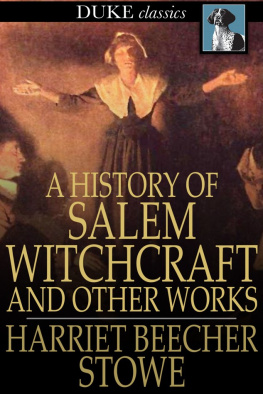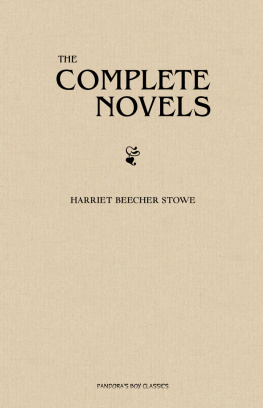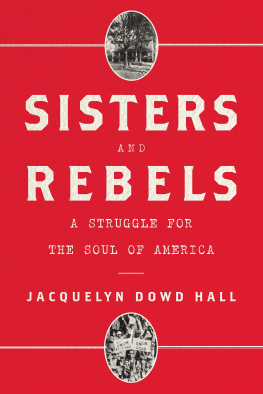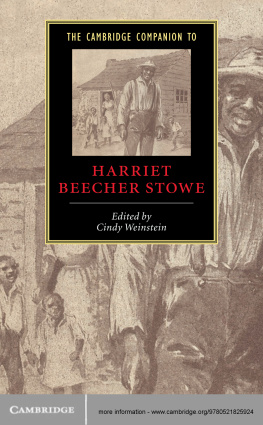A HISTORY OF SALEM WITCHCRAFT
AND OTHER WORKS
* * *
HARRIET BEECHER STOWE
*
A History of Salem Witchcraft
And Other Works
First published in 1886
ISBN 978-1-62013-483-2
Duke Classics
2013 Duke Classics and its licensors. All rights reserved.
While every effort has been used to ensure the accuracy and reliability of the information contained in this edition, Duke Classics does not assume liability or responsibility for any errors or omissions in this book. Duke Classics does not accept responsibility for loss suffered as a result of reliance upon the accuracy or currency of information contained in this book.
Contents
*
History of Salem Witchcraft
*
A REVIEW
OF
CHARLES W. UPHAM'S GREAT WORK.
FROM THE "EDINBURGH REVIEW."
With Notes,
BY THE EDITOR OF "THE PHRENOLOGICAL JOURNAL."
BIGOTRY. Obstinate or blind attachment to a particular creed;unreasonable zeal or warmth in favor of a party, sect, or opinion;excessive prejudice. The practice or tenet of a bigot.
PREJUDICE. An opinion or decision of mind, formed without dueexamination of the facts or arguments which are necessary to a just andimpartial determination. A previous bent or inclination of mind for oragainst any person or thing. Injury or wrong of any kind; as to act tothe prejudice of another.
SUPERSTITION. Excessive exactness or rigor in religious opinions orpractice; excess or extravagance in religion; the doing of things notrequired by God, or abstaining from things not forbidden; or thebelief of what is absurd, or belief without evidence. False religion;false worship. Rite or practice proceeding from excess of scruples inreligion. Excessive nicety; scrupulous exactness. Belief in the directagency of superior powers in certain extraordinary or singular events,or in omens and prognostics.Webster.
Introduction
*
The object in reprinting this most interesting review is simply to showthe progress made in moral, intellectual, and physical science. Thereader will go back with us to a timenot very remotewhen nothing wasknown of Phrenology and Psychology; when men and women were persecuted,and even put to death, through the baldest ignorance and the mostpitiable superstition. If we were to go back still farther, to the HolyWars, we should find cities and nations drenched in human blood throughreligious bigotry and intolerance. Let us thank God that our lot iscast in a more fortunate age, when the light of revelation, rightlyinterpreted by the aid of SCIENCE, points to the Source of allknowledge, all truth, all light.
When we know more of Anatomy, Physiology, Physiognomy, and the NaturalSciences generally, there will be a spirit of broader liberality,religious tolerance, and individual freedom. Then all men will holdthemselves accountable to God, rather than to popes, priests, orparsons. Our progenitors lived in a time that tried men's souls, asthe following lucid review most painfully shows.
S. R. W.
Salem Witchcraft
*
THE PLACE.
The name of the village of Salem is as familiar to Americans as that ofany provincial town in England or France is to Englishmen and Frenchmen;yet, when uttered in the hearing of Europeans, it carries us back two orthree centuries, and suggests an image, however faint and transient, ofthe life of the Pilgrim Fathers, who gave that sacred name to the placeof their chosen habitation. If we were on the spot to-day, we should seea modern American seaport, with an interest of its own, but by no meansa romantic one. At present Salem is suffering its share of the adversitywhich has fallen upon the shipping trade, while it is still mourning theloss of some of its noblest citizens in the late civil war. No communityin the Republic paid its tribute of patriotic sacrifice more generously;and there were doubtless occasions when its citizens remembered theearly days of glory, when their fathers helped to chase the retreatingBritish, on the first shedding of blood in the war of Independence. Butnow they have enough to think of under the pressure of the hour. Theirtrade is paralyzed under the operation of the tariff; their shipping isrotting in port, except so much of it as is sold to foreigners; thereis much poverty in low places and dread of further commercial adversityamong the chief citizens, but there is the same vigorous pursuit ofintellectual interests and pleasures, throughout the society of theplace, that there always is wherever any number of New Englandershave made their homes beside the church, the library, and the school.Whatever other changes may occur from one age or period to another,the features of natural scenery are, for the most part, unalterable.Massachusetts Bay is as it was when the Pilgrims cast their first lookover it: its blue watersas blue as the seas of Greecerippling upupon the sheeted snow of the sands in winter, or beating against rocksglittering in ice; in autumn the pearly waves flowing in under thethickets of gaudy foliage; and on summer evening the green surfacesurrounding the amethyst islands, where white foam spouts out of thecaves and crevices. On land, there are still the craggy hills, and thejutting promontories of granite, where the barberry grows as the brambledoes with us, and room is found for the farmstead between the crags, andfor the apple-trees and little slopes of grass, and patches of tillage,where all else looks barren. The boats are out, or ranged on shore,according to the weather, just as they were from the beginning, only inlarger numbers; and far away on either hand the coasts and islands,the rocks and hills and rural dwellings, are as of old, save for theshrinking of the forest, and the growth of the cities and villages,whose spires and school-houses are visible here and there.
THE SALEMITE OF FORTY YEARS AGO.
Yet there are changes, marked and memorable, both in Salem and itsneighborhood, since the date of thirty-seven years ago. There was thenan exclusiveness about the place as evident to strangers, and as dear tonatives, as the rivalship between Philadelphia and Baltimore, while farmore interesting and honorable in its character. In Salem society therewas a singular combination of the precision and scrupulousness ofPuritan manners and habits of thought with the pride of a cultivatedand traveled community, boasting acquaintance with people of all knownfaiths, and familiarity with all known ways of living and thinking,while adhering to the customs, and even the prejudices, of theirfathers. While relating theological conversations held with liberalBuddhists or lax Mohammedans, your host would whip his horse, to gethome at full speed by sunset on a Saturday, that the groom's Sabbathmight not be encroached on for five minutes. The houses were hung withodd Chinese copies of English engravings, and furnished with a varietyof pretty and useful articles from China, never seen elsewhere, becausenone but American traders had then achieved any commerce with thatcountry but in tea, nankeen, and silk. The Salem Museum was the gloryof the town, and even of the State. Each speculative merchant who wentforth, with or without a cargo (and the trade in ice was then onlybeginning), in his own ship, with his wife and her babes, was determinedto bring home some offering to the Museum, if he should accomplish amembership of that institution by doubling either Cape Horn or the Capeof Good Hope. He picked up an old cargo somewhere and trafficked withit for another; and so he went onif not rounding the world, seeingno small part of it, and making acquaintance with a dozen eccentricpotentates and barbaric chiefs, and sovereigns with widely celebratednames; and, whether the adventurer came home rich or poor, he was sureto have gained much knowledge, and to have become very entertainingin discourse. The houses of the principal merchants were pleasantabodeseach standing alone beside the street, which was an avenuethick-strewn with leaves in autumn and well shaded in summer. Not faraway were the woods, where lumbering went on, for the export of timberto Charleston and New Orleans, and for the furniture manufacture, whichwas the main industry of the less fertile districts of Massachusetts inthose days. Here and there was a little lakea "pond"under the shadowof the woods, yielding water-lilies in summer, and ice for exportationin winteras soon as that happy idea had occurred to some fortunatespeculator. On some knoll there was sure to be a school-house. Amidthese and many other pleasant objects, and in the very center of thestranger's observations, there was one spectacle that had no beauty initjust as in the happy course of the life of the Salem community thereis one fearful period. That dreary object is the Witches' Hill at Salem;and that fearful chapter of history is the tragedy of the WitchDelusion.








